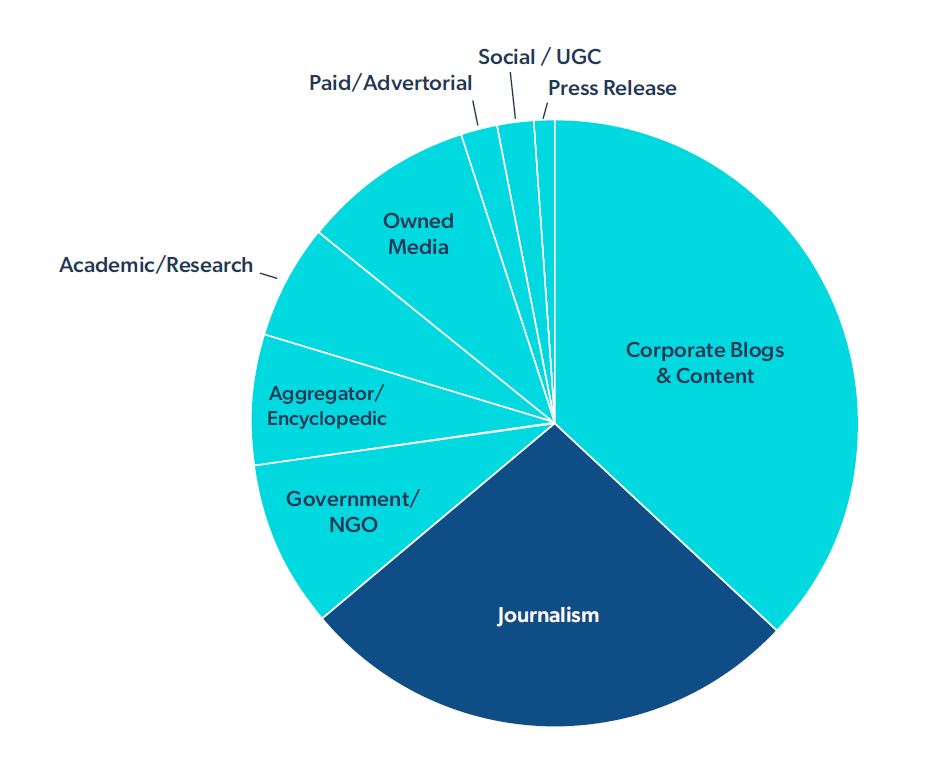Generative AI is Making PR More Important Than Ever

The growing popularity of AI tools is upending marketing and communications strategies businesses have relied on for the last 20 years.
How should businesses adapt to the increasingly AI-focused digital world? A foundational strategy is investing in public relations. Because earned media is an important source of information for generative AI tools.
When Will AI Tools Become More Popular Than Search Engines?
I expect AI tools will eventually supplant search engines as more and more internet users find AI-generated answers more useful than a list of blue links.
A recent study from Morning Consult, Americans Can’t Look Away From AI Summaries, confirms this trend. The key takeaways from this report:
“Approximately 3 in 5 (58%) U.S. adults said they refer to AI-generated summaries when conducting online searches, and 1 in 10 said that they only consult these summaries — meaning they don’t scroll down any further to review full search results.
“Young people, employed U.S. adults and high-earners were the most likely to report exclusively looking at AI summaries while searching online. These groups are also among the biggest users and supporters of the technology in general.
“Consumers are pleased with these features thus far: Across the seven common use cases we tested, roughly two-thirds of U.S. adults said that they find AI summaries ‘very’ or ‘somewhat‘ helpful.”
Whether it’s in six months or 12 months, sooner—rather than later—AI results will be more commonly used and relied on than search engine results pages. One indicator to watch for is when Google makes AI mode the default option instead of traditional search.

AI Optimization is Edging Out Traditional Search Engine Optimization (SEO)
For decades, an informal agreement existed between Google and businesses that created online content. In the words of Cloudflare’s Matthew Prince on a recent episode of the New York Times podcast Hard Fork:
“25 years ago, basically, Google struck a deal, an implicit deal, with publishers, which was you let us copy all of the content that you’re creating, and in exchange, we’ll send you traffic. And the whole web, the economy of the entire web, was really built on that search-based interface.”
Now, with the growing popularity of ChatGPT and the introduction of AI Mode and AI overviews, search engines are no longer sending nearly as much traffic to websites as they were even a few years ago.
That’s because, although AI tools do often provide footnotes or sources for their answers, they are increasingly zero-click experiences for the users. In other words, people who used to click on links from search engines like Google, are instead getting the answers they need from an AI query and rarely, if ever, clicking on a link to the source of the answer.
So, what does this mean for businesses? If you’ve relied on Google for website traffic, it’s time to rethink your strategy and take steps to be included in AI-generated answers.
Because visibility in those answers can still raise awareness and credibility for businesses. And being listed as a source can lead to high-intent traffic to a business’s website, but not as much as Google used to deliver.
In short, businesses need to start focusing on AI Optimization in addition to traditional SEO.
What’s Old is New Again: Earned Media Matters
One of the best ways for businesses to position themselves and their experts as sources for generative AI tools is earned media. And one of the best ways to secure media coverage is through public relations.
In a recent Semafor piece, journalist Ben Smith emphasized the importance of PR in influencing AI tools. “[A]uthoritative publications,” he writes, “including declining local news outlets and specialist trade journals—shape the results of chatbot queries about a given company.”
Smith’s assertion is supported by a recent study published by Muck Rack (available for download). This analysis reports that 27% of links cited by AI are journalistic. And while each model has a different mix of sources, most tend to cite well-known sources such as Reuters, Associated Press and the Financial Times. AI systems also prefer stories written in the last year.

Source: Generative Pulse by Muck Rack: What Is AI Reading?
This means that the most successful PR professionals will learn to influence AI-generated content by targeting sources used to training large language models. As noted above, these can include local news outlets, trade publications, and niche blogs, channels that PR has long cultivated but are now more valuable than ever.
For my colleagues in PR, this represents a return to fundamentals: if you want AI to talk about your brand, you need to be part of the public discourse in pieces authored by journalists.
Rand Fishkin, co-founder of SparkToro, puts it even more bluntly: “Public relations is the future of marketing.” In his view, the most influential content in the AI era isn’t ads or SEO-optimized blog posts, it’s earned media, newsletters, and expert commentary. These are the sources AI tools ingest and amplify, and that PR professionals are skilled at placing expert sources in.
What About Podcasts?
Most AI tools do not currently index and use podcast audio content when generating responses to a query.
Now, if a podcast has a published transcript online, and that page is publicly accessible and indexable, AI tools may retrieve that transcript. This is more likely with:
- Popular podcast websites or Substack posts
- News articles that summarize podcast episodes
- YouTube podcast episodes with captions or transcripts
The Importance of Owned Content
While a successful PR-focused campaign is necessary for brands in 2025, it’s not sufficient. Most AI tools will also look for content built around E-E-A-T (experience, expertise, authority and trustworthiness). In addition to securing earned media, companies should also be investing in their own high-quality online content. This can include:
- Press Releases: According to the same Muck Rack study, press releases are a small but valuable source of information for AI models. In addition, the typical structure of press releases already lends itself to content structured in a way that is easy for AI tools to understand and consume. So even though they don’t contribute as much as earned media, they are a quick way to publish AI-friendly content online.
- Corporate Blogs & Content: Websites that publish well-written, expertly sourced content such as blogs, thought leadership pieces, glossaries, fact sheets, or comparison tables seem to be more likely cited by AI models. According to Search Engine Land, these kinds of content should target informational and long-tail keyword phrases (like “how to choose the right data center for a growing business”).
Consider User Generated Content (UGC) Platforms Like Reddit and Quora
Evidence exists that AI models often train on UGC platforms like Reddit and Quora to capture authentic human conversations, opinions, and explanations. The extent and nature of that use varies, however, depending on the tool, its training data and its access model.
While Reddit and Quora aren’t traditionally considered under the purview of public relations, PR experts can help brands craft content to publish on those channels.
What Brands Should Do Now
To adapt to this rapidly emerging digital world that is increasingly built around AI optimization, brands should focus on the following
- Earned Media First: Prioritize a public relations strategy aimed at securing placements in trusted outlets AI models are likely to cite.
- Thought Leadership: Develop expert commentary and original insights positioning your experts as sources for AI-generated answers. This should be part of an overall PR strategy.
- Build Your Brand: AI tools often prefer popular brands, so building a recognizable online brand presence is crucial. And effective PR is key to this stage.
- Invest in Owned Content: Focus on creating comprehensive, easy-to-understand content to publish on your online channels in the form of press releases, blogs, FAQs, website content, fact sheets and the like.
- AI Monitoring: Track how your brand appears in AI-generated content and adjust your strategy accordingly.
Summary: PR is More Valuable Than Ever for Brands
AI is changing how people find, evaluate, and trust information. In this new world, PR is the strategy that can help ensure your brand is indexed, used and cited by generative AI tools.
As consumers shift from search engines to AI tools for answers instead of links, brands will have to work to make sure large language models represent them favorably. The most effective strategy is to positively influence the critical sources these models prioritize, especially earned media.
Note: This post is a follow up to my blog from 2024: “Is SEO Dead? Spoiler Alert-It’s Not, But It Is Evolving.”
Additional Source: LinkedIn post from SEMRush.
Contact Us
